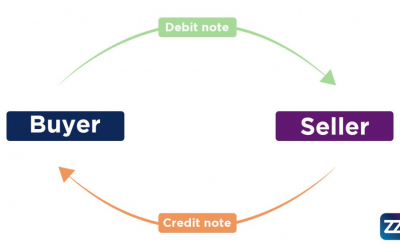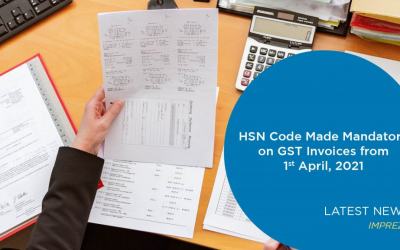
Accounting is one of the most discussed topics in the world of business. Not only business owners, but even a regular employee is also familiar with accounting. They send bills, keep a record of profits, losses, and costs. Every business is involved in some form of accounting irrespective of its scale. Understanding accounting basics under GST is necessary to manage finances for your business and personal life.
Statistics prove that 82% of all businesses mostly fail due to inadequate or insufficient cash flow management. About 99.7% of small companies are more likely to encounter negative cash flow management (source: https://www.smallbizgenius.net). Accounting indeed seems to be a daunting task. However, here’s a comprehensive COVID-19 guide to accounting basics; become your own accountant.
In this article, you will learn the concept of the accounting system, accounting principles, importance of accounting, and small business accounting 101 checklists to help you start or grow your small business ideas.
Basics of Financial Accounting for Entrepreneurs & Business Owners
Business owners or entrepreneurs cannot rely on accountants entirely; they need to make sure they are doing it right. Managing cash flow requires a basic understanding of accounting fundamentals, importance and types. We have coupled a list of topics that will help you better understand the basics of finances.
Basic Accounting Principles

Accountants or businesses must adhere to a particular set of rules and benchmarks while reporting financial statements. The common set of accounting standards accepted universally are known as accounting principles. Although each country’s accounting principles differ, they are mostly noticed to be of the same fashion.
Accounting standards are framed to ensure that the principles of reporting financial statements are understandable for businesses across the world. Here’s a list of Generally Accepted Accounting Principles (GAAP) that every business owner should know.
1. Economic Entity
The principle states that the owner and the business are two different entities; each carries various liabilities.
2. Revenue Recognition
The principle ensures that the revenue generated by a business is recognised on the accrual basis of accounting.
3. Conservatism
The principle suggests accountants and businesses adopt the most unfavourable option under a situation where there is more than one acceptable option for reporting.
4. Consistency
The principle states that any business can break the consistent usage of accounting methods when another exemplary method is better.
5. Historical Costs
The principle of historical costs mandates businesses to record their assets under the purchased values; whether assets were brought now or years ago.
6. Full Disclosure
The principle ensures that an enterprise provides full disclosure of all the necessary information concerning its users, investors or lenders in the financial statements as a footnote.
7. Going-Concern
The principle states that no business shall be forbidden from continuing forever. They can continue to achieve their goals and plans in the foreseeable future without intending to liquidate the enterprise.
8. Matching Concept
The principle ensures that the debit side of the financial statements matches with the credit side.
9. Materiality
The principle states that financial information with a material effect should form a part of the financial statements.
10. Monetary Unit
The principle states that only transactions stated in terms of currency with a monetary value should be recorded in the business accounts.
11. Reliability
The principle states that businesses must only record transactions that can be proven and carry significance evidence.
12. Revenue Recognition
The principle states that businesses’ revenue must be recognised on the occurrence of transactions regardless of the amount on actual receipts.
13. Time Period
The principal sets the standardised time period for reporting financial statements, i.e., monthly, quarterly or annually.
Read the detailed description of accounting principles’ various subjects, click here – Basic Accounting Principles for Beginners.
Importance of Accounting – Steps to Accounting 101

For businesses, accounting is more or less like the heart of a body. Managing finances effectively helps keep the business alive. Practical accounting is crucial to incorporate or grow a business successfully. What are the basic accounting procedures? How do you know if you are doing your accounting right? While there are several tips for money management available online, who has the time to examine them all?
Small businesses around the world can manage their financial operations effectively by implementing advanced accounting software like Imprezz. It helps business owners better focus on other crucial areas of business operations. However, small business accounting can be nailed by following a step-by-step guide to success. Here are seven significant steps to basic small business accounting.
Determine the Type of Business Entity
It is crucial to determining the entity type that best suits your business objectives before incorporation. Based on the complete information, it is ideal to ask for insights from a Certified Public Accountant (CPA). It can help in making the right financial decisions concerning the long-term tax implications and legal obligations.
Open a Bank Account Dedicated for Your Business
Never intermix your funds with business funds. Setting up a separate business account is a smart way to keep track of your business’ revenue generation. Moreover, it also streamlines the processes of managing your books and funds from a legal standpoint.
Set-Up an Accounting Software or Hire an Accountant
Businesses must analyse, track and report each transaction at the time of occurrence. Several software programs offer business intelligence tools, and it is one of the best ways to manage your accounting operations. You can choose Imprezz GST billing software, an integrated accounting platform your business must-have. Otherwise, you can also opt for outsourcing or bookkeeping methods for your business.
Track Your Business Expenses
Money is the fuel that keeps the business running; many expenses incurred while starting or growing a business. It is crucial to record all the necessary bills, documents, and receipts, including the expenditure of meals, business travels, goodies, and gifts.
Establish Budget & Forecast
Financial health primarily depends on money management. Thus, start-ups must have an estimation of incurring and outgoing expenditure for their businesses both in short-run and future. It helps business owners set their organisation goals accordingly.
Get-Going with a Payroll System
Payroll system plays a crucial role in paying employees and yourself. You cannot pay your employees casually through fund transfer or by writing a cheque. Several business intelligence software offers payroll management system. Otherwise, you can also outsource payroll management depending on the number of employees working at your firm.
Understand GST Requirements of Your Business
Your business must always comply with GST from day one. The Indian government has strict implications of GST that every registered company must follow. Do you run an unregistered business in India? It’s time for you to register your business and enjoy the tax benefits. Read more about the online GST registration process on our blog section.
Being well versed with your tax requirements include understanding the sales tax requirements, tax payment schedule and GST laws and rules. Tax schedule alone differs depending on your tax entity, business income, and tax payable to the government.
Personal Accounting
Personal accounts are related to individuals, companies, firms, corporates, group of association, etc. It may either belong to a natural person, artificial person or representative person. Personal accounting is carried out with the principle “debit the receiver, credit the giver”. With the implementation of a personal accounting information system, you will better understand your finances.
Daily Accounting
Bookkeeping is the process of recording each transaction daily, as and when it occurs. Recording daily accounting activities in an accounting system enables business owners to track their income and expenses that is crucial to draft financial statements and analysing the metrics of business finances.
Daily accounting involves various accounting tasks. Here’s a to-do list for your business’ daily accounts management.
- Refresh Your Financial Data
- Review & Reconcile Each Transaction
- Record Payments Received
- Track Your Accounts (Accounts Payable & Receivables)
- Record Inventories in the System
- Create and Send Invoices to Your Clients
- Pay/Schedule Your Payments
- Back-Up Your Financial Data
Online Accounting
You can either handle your accounts manually or by using Internet technologies. Online accounting is known as the most effective bookkeeping methods. Unlike manual recording, it offers error-free invoicing and GST returns filing. The modern online accounting system has successfully replaced traditional software, spreadsheets and manual paper-based accounting.
Accounting Vocabulary

Nailing the secret language of the accounting world is crucial to sustaining in the business. It would help if you familiarised yourself with the most common accounting terminologies to have a successful accounting career. To help you get started, we have listed some of the commonly used accounting terms.
- Accounts Receivable (AR)
- Accounting (ACCG)
- Accounts Payable (AP)
- Assets (Fixed and Current) (FA, CA)
- Asset Classes
- Balance Sheet (BS)
- Capital (CAP)
- Cash Flow
- Certified Public Accountant (CPA)
- Cost of Goods Sold (COGS)
- Credit
- Debit
- Diversification
- Enrolled Agent (EA)
- Expenses
- Equity
- Insolvency
- Generally Accepted Accounting Principles (GAAP)
- General Ledger (GL)
- Trial Balance
- Liabilities (Long Term & Current)
- Limited Liability Company (LLC)
- Net Income (NI)
- Profit & Loss Statement (P&L)
- Present value (PV)
- Return on Investment (ROI)
- Bonds & Coupons (B&C)
Do you want to have a clear understanding of accounting terms? Read more on – Definition of commonly used basic accounting terms – part-1 & part-2
Conclusion
Small business accounting might seem like a daunting task, but the efforts are always worth it. Accounting not only helps track your income and expenses; it also enables you to see the big picture. Accounting influences most of the critical business decisions. Be it simple calculations or understanding the tax obligations, master accounting disciplines by implementing ideal accounting software.
Imprezz is an online invoicing and billing platform; helping businesses stay GST compliant. Implement the software, and your business will thank you. We offer a 14 days free trial software program – Log in to get started.


